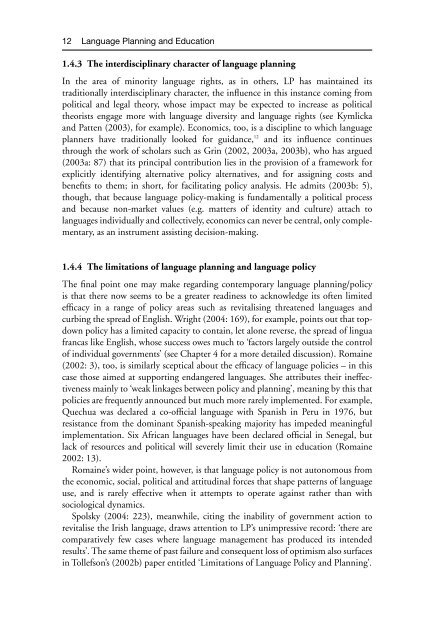Gibson Ferguson Language Planning and Education Edinburgh ...
Gibson Ferguson Language Planning and Education Edinburgh ...
Gibson Ferguson Language Planning and Education Edinburgh ...
You also want an ePaper? Increase the reach of your titles
YUMPU automatically turns print PDFs into web optimized ePapers that Google loves.
12 <strong>Language</strong> <strong>Planning</strong> <strong>and</strong> <strong>Education</strong><br />
1.4.3 The interdisciplinary character of language planning<br />
In the area of minority language rights, as in others, LP has maintained its<br />
traditionally interdisciplinary character, the influence in this instance coming from<br />
political <strong>and</strong> legal theory, whose impact may be expected to increase as political<br />
theorists engage more with language diversity <strong>and</strong> language rights (see Kymlicka<br />
<strong>and</strong> Patten (2003), for example). Economics, too, is a discipline to which language<br />
planners have traditionally looked for guidance, 12 <strong>and</strong> its influence continues<br />
through the work of scholars such as Grin (2002, 2003a, 2003b), who has argued<br />
(2003a: 87) that its principal contribution lies in the provision of a framework for<br />
explicitly identifying alternative policy alternatives, <strong>and</strong> for assigning costs <strong>and</strong><br />
benefits to them; in short, for facilitating policy analysis. He admits (2003b: 5),<br />
though, that because language policy-making is fundamentally a political process<br />
<strong>and</strong> because non-market values (e.g. matters of identity <strong>and</strong> culture) attach to<br />
languages individually <strong>and</strong> collectively, economics can never be central, only complementary,<br />
as an instrument assisting decision-making.<br />
1.4.4 The limitations of language planning <strong>and</strong> language policy<br />
The final point one may make regarding contemporary language planning/policy<br />
is that there now seems to be a greater readiness to acknowledge its often limited<br />
efficacy in a range of policy areas such as revitalising threatened languages <strong>and</strong><br />
curbing the spread of English. Wright (2004: 169), for example, points out that topdown<br />
policy has a limited capacity to contain, let alone reverse, the spread of lingua<br />
francas like English, whose success owes much to ‘factors largely outside the control<br />
of individual governments’ (see Chapter 4 for a more detailed discussion). Romaine<br />
(2002: 3), too, is similarly sceptical about the efficacy of language policies – in this<br />
case those aimed at supporting endangered languages. She attributes their ineffectiveness<br />
mainly to ‘weak linkages between policy <strong>and</strong> planning’, meaning by this that<br />
policies are frequently announced but much more rarely implemented. For example,<br />
Quechua was declared a co-official language with Spanish in Peru in 1976, but<br />
resistance from the dominant Spanish-speaking majority has impeded meaningful<br />
implementation. Six African languages have been declared official in Senegal, but<br />
lack of resources <strong>and</strong> political will severely limit their use in education (Romaine<br />
2002: 13).<br />
Romaine’s wider point, however, is that language policy is not autonomous from<br />
the economic, social, political <strong>and</strong> attitudinal forces that shape patterns of language<br />
use, <strong>and</strong> is rarely effective when it attempts to operate against rather than with<br />
sociological dynamics.<br />
Spolsky (2004: 223), meanwhile, citing the inability of government action to<br />
revitalise the Irish language, draws attention to LP’s unimpressive record: ‘there are<br />
comparatively few cases where language management has produced its intended<br />
results’. The same theme of past failure <strong>and</strong> consequent loss of optimism also surfaces<br />
in Tollefson’s (2002b) paper entitled ‘Limitations of <strong>Language</strong> Policy <strong>and</strong> <strong>Planning</strong>’.






